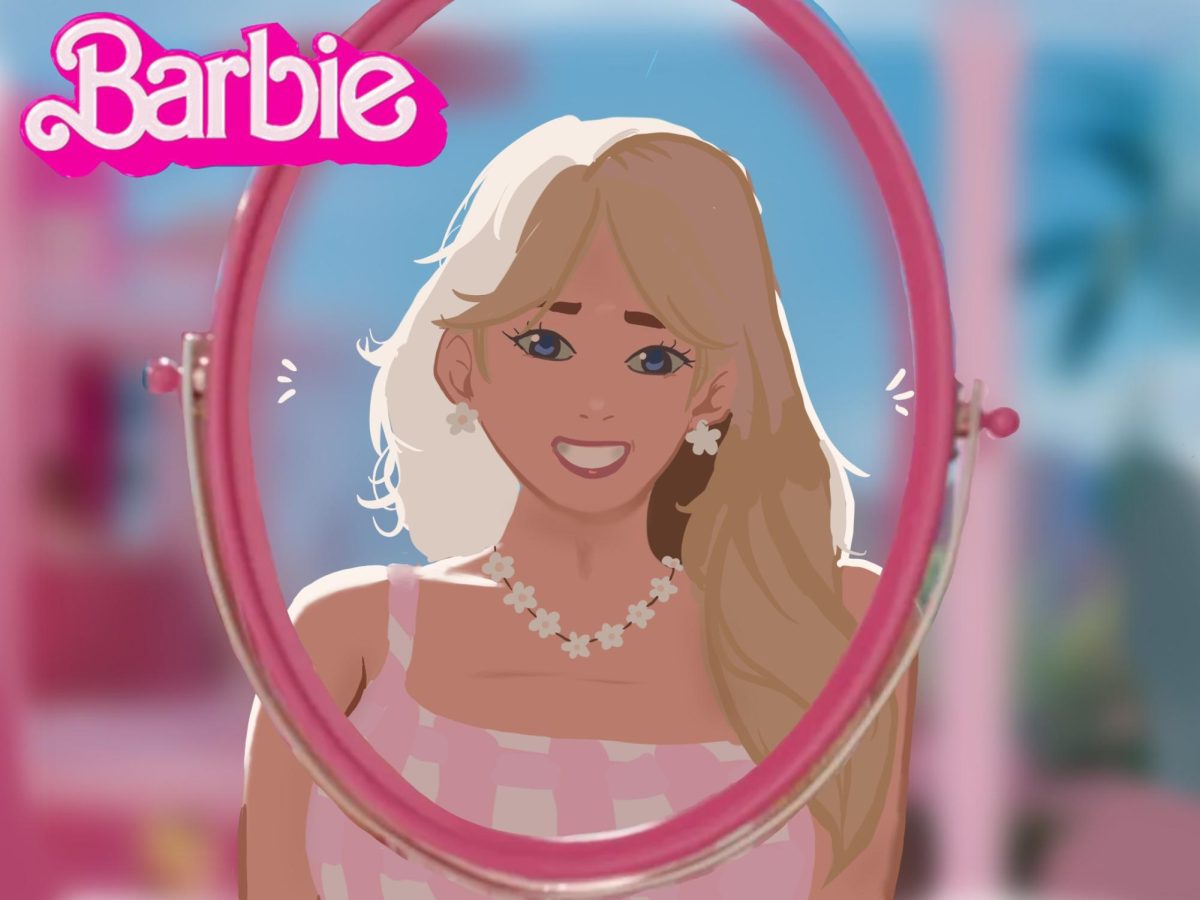On July 21, Barbie (2023) made its debut, quickly becoming the #1 trending film on all streaming services. With its upbeat music, famous cast and feminist message, the movie currently stands as a cult classic among women of all ages, promising to send pink mobs to the theater again and again with every rerun.
In Barbieland, the fantasy realm where all existing variants of Barbie reside, every single day is the same: perfect. After “solving sexism” by showing little girls their potential through dolls dressed as astronauts, doctors and Nobel prize winners, Barbies enjoy the freedom to be their best selves every day. Their lives are filled with hot showers, delicious food, background Kens vying for attention and absolutely no bad hair days ever, for anyone. That is, until Stereotypical Barbie, played by Margot Robbie, begins struggling with irrepressible thoughts of death.
Driven to action by the imminent threat of the collapse of life as she knows it, Barbie travels to the real world with a stowaway Ken in order to address the source of her less-than-glamorous transformations. However, once she arrives, she finds a lot more than just the human child who plays with her. In the real world, men are the astronauts, doctors and Nobel prize winners, while Barbie herself is nothing but the target of stares with “an undertone of violence.” Ken, ecstatic at the validation he suddenly feels after a lifetime of deprivation, is determined to bring this newfound patriarchy back to Barbieland and liberate his fellow Kens. Barbie, on the other hand, is disgusted by the way she is treated by both men and women in this new world, and enlists the humans she meets to help her prevent the patriarchy from taking hold at home.
The movie is silly and over the top, full of bright colors and exaggerated characters. Considering this high degree of sensory input, the movie is perfect for children who have not yet learned to focus their attention on things that do not outwardly demand it. However, clever quips, complex characters and the palpable passion that the actors have for their roles makes the film a perfect match for adult audiences, as well. It is gratifying to see a whole cast of people so genuinely invested in the parts that they have to play. The enthusiasm of the actors is contagious, stirring the audience and creating a potent joy for life.
The positive and supportive relationships shown between the women in the show is also a useful tool in teaching young girls how to support each other and believe in themselves. By addressing the struggles that the female population faces in the real world while praising the positive aspects of femininity, this movie teaches its audience that the bad things that happen to girls do not define them. The movie also ends with a strong message of independence and identity, prompting young viewers to define themselves by their own virtues and goal rather than by their relation to others.
While the overall message of the movie is positive, creating a sense of community and support among its female audiences, the set-up makes the resolution feel insincere and even a little bit dangerous if taken the wrong way. At the start of the movie, the Kens are clearly meant to be a humorous reflection of female status in the real world; they are barred from receiving the same accolades as the Barbies, have no influence in the all-female Supreme Court and do little more than act as eye-pieces or attendants for the Barbies going about their day-to-day lives. There are even instances of thinly-veiled sexual harassment and objectification of the Kens. While the reversed situation is meant to act as comedic relief, it unintentionally sends the message that this sort of treatment is justified if it’s towards men, which is one short step away from saying that this sort of treatment is justified, period.
The main Ken, clearly unhappy with his station in life, does not know any better until he visits the real world. In the real world, people see him as more than a background character; in the real world, he is a man. People ask him for the time, nod to him on the street and treat him as someone inherently worthy of respect. Looking closely at his previous way of life, his desire to recreate this energy at home no longer seems villainous, as it is portrayed in the movie, but like a natural desire for equality. When the Barbies inevitably prevail and restore world order at the end of the movie, the Kens are reinstated as background pieces with little to nothing no agency in their own lives. The movie is silly and light-hearted, but when seen from the Kens’ perspectives, can be twisted to represent an anti-suffrage movement. At the start of women’s fight for equality, it was a common tactic to vilify the most active players in the movement and attempt to convince women that they would be happier without the vote, stuck at home. With this context in mind, the quip made by President Barbie at the end of the movie about not letting a Ken onto the Supreme Court leaves a sour taste in the mouth. While little girls can walk away from the movie feeling empowered and proud of their femininity, little boys can walk away feeling confused, alienated and as if they have done something wrong.
Despite the slightly problematic nature of the movie’s conclusion, it has a genuinely positive feeling around it, as demonstrated by the high praise it has received on all social media platforms. Available on Prime Video, HBO max, Apple TV and more, Barbie is sure to become a cultural milestone for generations to come.



























